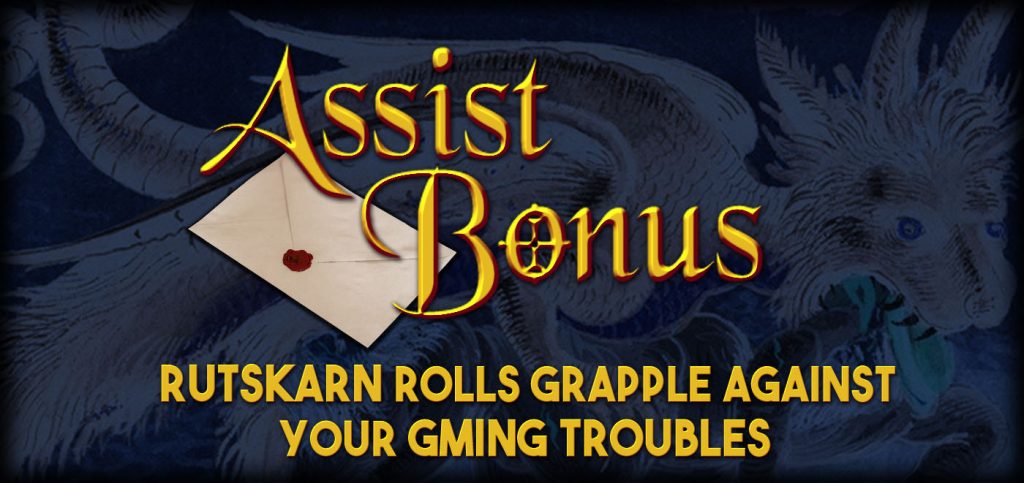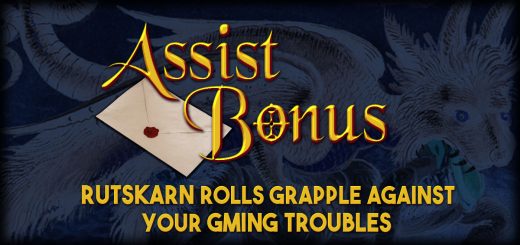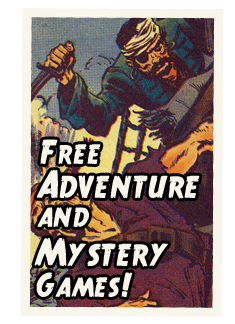Assist Bonus: How Do You Integrate Puzzles into a Campaign?

do you have any general tips for inserting puzzles into my campaign? I want to run them but also I’m not good at making up puzzles and also it’s hard to come up with justifications why my villains would put puzzles in their workplace
-Anonymous
I’m going to answer as if you’re running a fantasy adventure campaign. My advice should stand regardless, but for the sake of demonstration it’ll be easier to have one pool of genre tropes to draw from. If you’re actually running a grim Scandinavian story game where you play early impressionist painters, let me know and I’ll explain how to make puzzles for that instead.
Otherwise, I’ll start by asking you to think of your favorite “adventure” puzzle—ie, a puzzle which was part of a story. It could be from a particularly memorable dungeon or wizard’s tower or thief’s vault, it could be from a videogame (even one not known for its puzzles), it could even be from a movie like National Treasure or Indiana Jones. The only criteria I’m looking for is a) it had a narrative attached to it and b) you liked trying to figure it out (even if only vicariously through a protagonist).
Got a puzzle in mind? Good. Now ask yourself…does that puzzle make any sense outside of the context of an adventure game or movie?
The answer’s probably “not really.” Maybe it makes a little sense: maybe it’s even a way of representing something entirely reasonable and practical, like powering on a generator or calibrating an ancient artifact. But if the puzzle wasn’t even theoretically fun or interesting to solve—if, for example, it was solved by your character in a cutscene or with a die roll—would it still make any sense as part of the story? Or would it stick out as pointless and absurd?
The average game of Dungeons and Dragons contains six zillion harebrained and willful logic violations which promote adventure, excitement, and challenge. Everyone loves their +5 Vorpal Longswords, but if you give it even a little thought you’d have to admit that no reasonable monarch would allow landless peasants to hoard the most powerful weapons in the world. Looting dungeons is fun, but similarly, no reasonable economy would bear colossal infusions of antique-but-still-fungible currency. Combat is exciting, but no reasonable adversaries would pick a fair fight, square off one-on-one, and battle to the death even when things are going sideways. And yes, as you’ve pointed out, no reasonable villain would make a puzzle part of their stronghold. But the average group of players doesn’t care about any of that. They knew what they were getting into when they saw the dragon on the rulebook. You might or might not impress your players with conscientious kings, living economies, plausible combats, and flawlessly-integrated puzzles, but in an adventure game that all takes distant second place to having a good time.
So for most campaigns, a better question than “how do I justify puzzles” is “what are the best excuses to throw in puzzles?”
Assuming you’ve got a typical group, here’s your magic bullet: if the original builders of a dungeon or castle or temple are long dead, you’ve got a blank check to throw in any puzzle you’ve got lying around regardless of how dumb it is. Why do players need to stack blocks to lower the drawbridge, answer a riddle to open the treasure vault, or sing showtunes to light the forges? Who knows. The answer’s lost to time. If they insist on asking, pull a blank face and say history is the greatest puzzle of them all. If the original puzzle creators are poorly understood and shrouded in mystery, most groups don’t bother putting them on trial.
If that’s a little too silly for your group, one level above that is the classic puzzle as security system. As long as your puzzle would do a reasonable job screening out people who shouldn’t be permitted and letting in people who should, it’ll pass most group’s basic sniff tests. A match-pictures-to-pictures puzzle which requires knowledge of a guild’s history might block off access to their stronghold; players will need to somehow glean the guild’s history by trickery, research, or inference. Angels might seal off a powerful item with a puzzle that seemingly tests logic, but sneakily forces the testee to choose between an altruistic but perilous path (which leads to the item) or a safe but selfish one (which does not). Aquatic creatures might seal a door off with a very simple lever puzzle which happens to be thirty feet underwater; the real puzzle becomes, “how do land-breathers solve it and break in?” To create this kind of puzzle, begin by asking yourself what quality is being selected for and figuring out a straightforward way to test it.
My players once discovered that a witch’s inner sanctum could only be opened by her blind and dimwitted butler statue. When flattered and cajoled, he revealed that he recognized the witch by:
- Her “signature” handshake
- Her “unique” voice
- Her “distinctive” breath
Their puzzle now became: “how do we simulate the grip, voice, and breath of the witch when we’ve never even met her?” By scouring the witch’s home they found long-fingered gloves, a stashed tin of chewing tobacco, a nearly-empty bottle of liquor, and an enchanted portrait of her which howled abuse at anyone who disturbed or insulted it. Putting these elements together, they managed to contrive a simulated witch that fooled the butler.
If your players would balk at even this level of puzzle as contrived or unsuited to the tone of the campaign, you’re going to have to step up your game. At this point, you’re no longer presenting “puzzles” in the sense of a straightforward self-contained mental exercise. Instead you’re providing open-ended problems which simply lack an obvious and accessible solution. Here are some prompts to get you started:
- The Investigation: Present a mystery and enough evidence to crack it. Your players can hardly object that an unsolved murder is “unrealistic,” and it provides the same change of pace and mental stimulation as a traditional puzzle. These can be expansive, involving dozens of pieces of evidence and suspects, or as simple as “How the hell are goblins getting into this fenced-off graveyard?”
- The Ritual: An important spell requires bizarre or impossible ingredients: “a frog’s teeth,” “a wedding dress that’s never been worn,” “a coward’s courage,” etc. The party has to tangle with the world’s weirdest shopping list; listen to them reason whether a frog presented with teeth can be said to own those teeth, or whether a frog transformed into a tooth-bearing creature is still metaphysically a frog.
- The Vampire: The party faces a far more powerful adversary. How is it vulnerable? How can its defenses be overcome and retaliations avoided?
- The Hitch: Have your players stumble onto an opportunity or prize which can’t be straightforwardly obtained and ask them to figure out how to get there. Consider the ending of The Italian Job: a truck full of stolen gold is hanging off a cliff and precariously balanced. If the criminals attempt to recover the gold, the truck will teeter off and the money will be lost. If the criminals attempt to retreat to safety, the truck will teeter off and the money will be lost. Once you’ve got your thorny obstacle, give the players ample time to explore and overcome it.
The advantage of the last three approaches is that practically speaking, you’re not “coming up with a puzzle.” The most difficult part of puzzle design is creating an interesting solution, but for a creative and open-ended tabletop game, you can skip it: just present players an interesting problem, throw them a box of spare parts, and let them come up with their own solution. Start with simple problems (“There’s a chest full of gold, but it’s at the bottom of the lake”) and if they handle those well, graduate to more complicated problems (“There’s a chest full of diamonds, but it’s trapped in the belly of a random sea monster which was only briefly glimpsed by a sailor currently awaiting the gallows.”) This is my only straightforward, practical advice for GMs who struggle to design puzzles beyond “steal ’em from the internet.” I recommend presenting this kind of open-ended problem as an optional opportunity rather than a necessary challenge; otherwise your players might get grouchy when they find out you had no reasonable idea of how they’d handle it.
Above all, remember that your players will forgive almost anything that’s fun. There’s no shame in coming up with (or pilfering) a puzzle first and figuring out how to crowbar it in second. Your group might even make a crack about it, in the same way they joke about carrying around a dozen guns in a videogame, but that doesn’t mean they actually care…and if they don’t, maybe you shouldn’t either.






